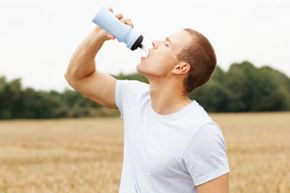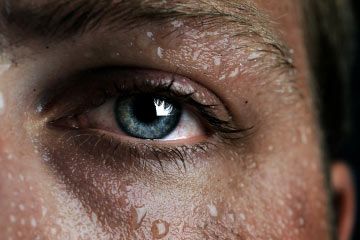Water is the world's most abundant substance, covering nearly three-quarters of the globe [source: Gleick] and comprising 60 percent of the human body [source: Schirber]. It's vital to virtually every human biological process and may be the single healthiest substance on Earth. But, as if to prove the point that you can have too much of a good thing, it turns out it's possible to overdo H20.
And if you think too much water doesn't sound too bad, be warned -- it can be fatal.
Advertisement
Hyponatremia occurs when excessive fluid consumption dilutes salt levels and creates a sodium imbalance in the body. In an effort to reverse this imbalance, cells allow water to seep in, causing them to swell. Most cells can manage, but because the brain has little room in the skull, even slight swelling can result in big problems, including disorientation, loss of consciousness, seizure and death.
Cases of hyponatremia are rare and started occurring with some frequency in the 1980s as the popularity of running exploded [source: Engler]. Dr. Tim Noakes, a sports-medicine physician and author of the popular book, "The Lore of Running," began hearing about athletes experiencing overhydration during events. This was unheard of in fitness circles, where the rule of thumb had been to stay hydrated by drinking loads of fluids before, during and after a race. But as incidents increased, Noakes dived into the data and published the first paper on the subject, "Water Intoxication: A Possible Complication During Endurance Exercise." Since then hyponatremia has become a primary concern for athletes and sports physicians.
Shockingly, in the history of running, not a single death has been attributed to dehydration [source: Kolata]. Hyponatremia, on the other hand, has been blamed for more than a dozen deaths in recent years [source: Kolata]. According to a study in The New England Journal of Medicine, 13 percent of nearly 500 runners studied at the Boston Marathon finished the race in a state of hyponatremia. These runners were predominantly less experienced athletes who took longer to complete the race.
And while it's important to stay hydrated as a way to replenish fluids lost to perspiration, sweat is a combination water and salt, and water or sports drinks alone can't compensate for the sodium depletion that occurs during an event. Endurance events in particular may last several hours, which means more time on the course to take in fluids [source: Wadyka]. The result is a fluid saturation that has become an even bigger health threat than dehydration.
In this article, we'll take a close look at hyponatremia, its symptoms and how it can be treated.
Advertisement




